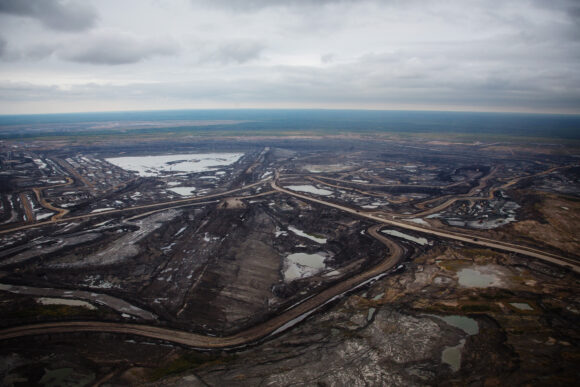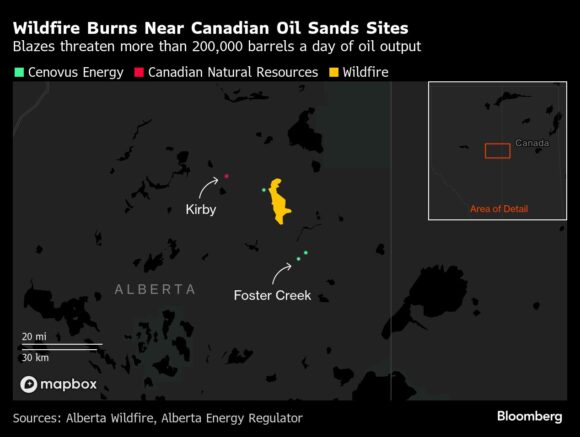Wildfires are threatening about 5% of Canada’s crude output as a blaze in Alberta’s oil sands region spreads and approaches major production sites.
A total of 26 out-of-control fires are burning in the province amid hot, dry weather, bringing flames within 20 kilometers (12 miles) of about 245,000 barrels of daily oil production, according to data from Alberta’s energy regulator and wildfire department. The province had only four out-of-control fires on Monday.
A blaze near Cold Lake, along Alberta’s eastern border, has grown to more than 9,000 hectares and prompted Cenovus Energy Inc. to remove non-essential workers from its nearby Foster Creek site. Canadian Natural Resources Ltd. said operations are “steady” at its Kirby oil sands site, which is farther from the blaze.
Read more: Wildfires Erupt Near Alberta Oil Well Sites Amid Hot Weather
Canada, the world’s fourth-largest oil producer, has long seen its energy output threatened by wildfires that rage through the dense forests of northern Alberta in spring and summer. In 2016, a blaze burned down parts of Fort McMurray, the unofficial capital of the oil sands region, and shut down the massive oil sands mines just north of the city, taking more than 1 million barrels of daily production offline.
Canadian heavy crude’s discount to US benchmark West Texas Intermediate shrank to $9.45 a barrel on financial markets Thursday, according to a person familiar with prices. That discount would be the narrowest since May 15, according to General Index prices compiled by Bloomberg.
Strong and persistent winds are hampering efforts to contain the multiple blazes north of Edmonton, Alberta Wildfire said in an update. Heat warnings persist across northern and central Alberta, with daytime highs climbing to 30C (86F) and raising the risk of heat exhaustion and heat stroke for firefighters, according to Environment and Climate Change Canada. Friday is forecast to be sunny, though not as hot, but it isn’t until Saturday that showers arrive and highs drop to 22C.
In addition to the heat, winds will sweep in from the south and west, potentially gusting to 50 kilometers (30 miles) per hour, the agency said.
“Tomorrow is going to cool down, but unfortunately there will be a lot of wind coming through those areas tonight,” said Brett Anderson, a meteorologist with commercial forecaster AccWeather Inc. “The fires up in those areas aren’t going anywhere.”
Smoke Threat
The larger issue is smoke, which has caused air quality to range from unhealthy to hazardous across parts of Alberta, Saskatchewan and Manitoba, according to AirNow.gov.
While a lot of the smoke is higher in the sky, it may drop down as it blows into northern Minnesota, Wisconsin and Michigan’s Upper Peninsula in the coming days, creating hazardous conditions there, Anderson said. It will also even bring a hazy cast to Chicago this weekend, though air quality on the surface shouldn’t suffer, he said.
The town of Swan Hills in central Alberta was put under an evacuation order earlier this week because of a nearby fire, which prompted a smaller oil driller called Aspenleaf Energy Ltd. to shut in the equivalent of about 4,000 barrels of daily production. Well sites operated by Texcal Energy Canada Inc. are now within that fire’s perimeter, according to government data. Communities including Chipewyan Lake, Red Earth Creek and Peerless Trout First Nation are also under evacuation orders.
Alberta isn’t the only province grappling with fires. Manitoba declared a province-wide state of emergency on Wednesday amid intensifying blazes in the northern part of the province, and neighboring Saskatchewan did the same on Thursday. Thousands of people are being evacuated across the region.
Photograph: The Suncor Energy Inc. Millennium mine is seen in this aerial photograph taken above the Athabasca oil sands near Fort McMurray, Alberta, Canada, on Monday, Sept. 10, 2018. Photo credit: Ben Nelms/Bloomberg
Topics Catastrophe Natural Disasters Wildfire Energy Oil Gas Canada
Was this article valuable?
Here are more articles you may enjoy.




 CFC Owners Said to Tap Banks for Sale, IPO of £5 Billion Insurer
CFC Owners Said to Tap Banks for Sale, IPO of £5 Billion Insurer  Experian Launches Insurance Marketplace App on ChatGPT
Experian Launches Insurance Marketplace App on ChatGPT  Jury Finds Johnson & Johnson Liable for Cancer in Latest Talc Trial
Jury Finds Johnson & Johnson Liable for Cancer in Latest Talc Trial  Judge Tosses Buffalo Wild Wings Lawsuit That Has ‘No Meat on Its Bones’
Judge Tosses Buffalo Wild Wings Lawsuit That Has ‘No Meat on Its Bones’ 

